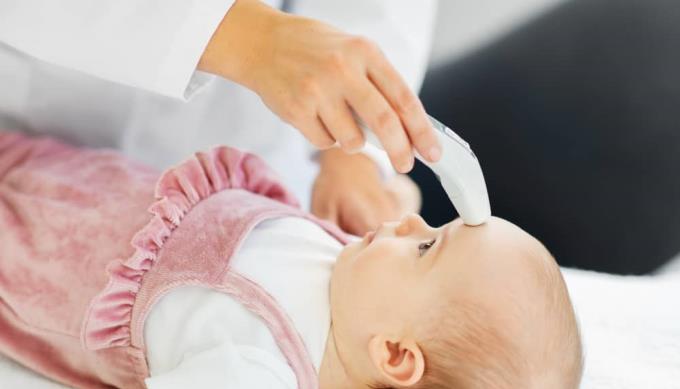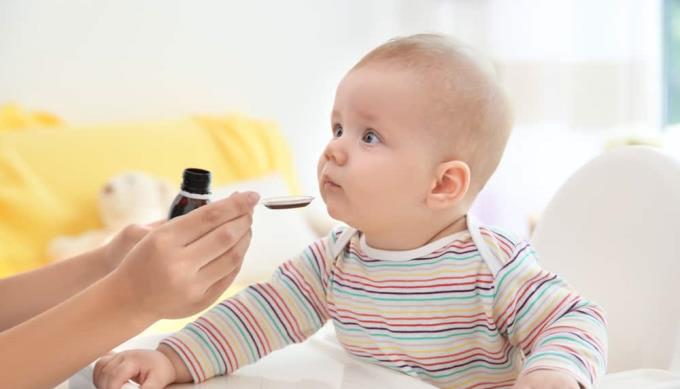Ways to determine an infants caloric needs

Learn how to determine your baby’s caloric needs, including the calories in breast milk and formula, to ensure your infant gets the right nutrition for healthy growth.
Every time your baby has a fever, you get anxious and try to reduce it. Parents always want to learn the best knowledge about fever in babies, but there will be 7 surprises about fever in babies that not all parents know.
As a parent, every time you see your baby uncomfortable, high fever, you will definitely feel hurt, worried and have to do something to help your child overcome. The high temperature in a baby causes fear for parents, for example, fear that a high fever will lead to seizures or possibly death. Have you ever haunted your child's fevers? Armed with the good knowledge of the matter, you will be more comfortable dealing with it. Let's join aFamilyToday Health to learn about the problem of fever in children.
Baby wakes up with flushed cheeks, steaming fans. You take a thermometer out and the result is 37.7 ° C. What should you do now? Should fever-reducing medicine or take your baby to a doctor? In fact, you don't have to do anything yet because your baby doesn't qualify for a fever.
For babies, temperatures below 38 ° C are simply a fluctuation around 37 ° C. Like adults, a baby's temperature increases for many reasons, from taking a warm bath to over dressing. In addition, time of the day also has an impact on the baby's body temperature: baby's body temperature tends to be higher in the late afternoon and lower in the early morning. So, unless the thermometer is only 38 ° C or higher, you can rest assured that your baby doesn't have a fever.

A viral fever occurs when the body reacts to a viral illness, such as a bowel disease, the flu or the common cold. Viral fever tends to subside over 3 days. Antibiotics are ineffective against the virus, so are not prescribed.
Bacterial fever occurs when the body reacts to an infection caused by a bacteria, such as an ear infection (which can be bacterial or viral), a urinary tract infection, or bacterial pneumonia. Bacterial fever is less common, but it worries many more as it can lead to many other serious illnesses. Antibiotics are used in this case. If your newborn has a fever for more than 3 days, see your doctor.
If your baby is under 3 months old, you should pay special attention to your baby's fever. If your baby's temperature is 38 ° C or higher, you need to take your baby to the hospital to see him immediately. Do not take fever-reducing medicine (unless told to do so by your doctor), do not hide any symptoms other than fever when the doctor examines your baby.
Why should I take my baby to the hospital immediately? Babies don't show signs of a serious infection like older babies. This is very worrying because your baby may have a complete blood infection ( sepsis ) without showing typical symptoms.
If, after examining, the child has a fever that is not caused by a common cold or viral infection, the doctor may order the baby to do blood and urine tests to determine if he or she has a bacterial infection and Lumbar spinal puncture to see if your baby has meningitis .
You may be hesitant to take your baby's rectal temperature (insert thermometer into the anus), but this is the best way to know the exact temperature.
Only rectal temperature gives the most accurate results. Measured in the armpit, forehead, even ears is not accurate. When measured at these sites, the temperature is usually lower than in the body. This puts you under unnecessary stress.
Please refer to the article Do parents know how to measure their child's temperature?
Many parents think that the higher the fever, the worse the baby is. However, the reality is not so. A child with a fever of 39.4 ° C can be completely comfortable playing on his mat at first, while another child with a fever of 38.3 ° C is fussy, tired and wants to be held.
This means that if your baby has a fever and is comfortable, you don't have to use the fever-reducing strategy for your baby. Instead of focusing on thermometer fluctuations, pay attention to other signs to determine what your baby is sick.

Before using fever-reducing medicine, try lowering your baby's fever with a warm wet washcloth. This approach is surprisingly effective. Use warm water (29 - 32 ° C) to wipe your baby's body, especially the forehead and armpits. If your baby feels uncomfortable and a warm compress is not working, use a fever-reducing medicine. However, you need to note:
If the baby is younger than 6 months old, doctors recommend acetaminophen (paracetamol) rather than ibuprofen. Starting at 6 months, most babies can take either acetaminophen or ibuprofen.
Determine dosage by baby's weight, not age.
Do not give aspirin to your baby, as it is linked to Reye's syndrome , a rare but extremely dangerous disease.
Please see more article: What should and should not be done when a child has a fever?
You've heard a lot about fever, but in fact, it doesn't hurt your baby's brain. Even high fever seizures have never been shown to cause harm (and cannot be prevented with medication).
Don't worry, a fever never lasts indefinitely. Normally, the body will begin to cool down at 41.1 ° C. High temperatures are your body's way of fighting off invading agents such as viruses, infections or vaccinations. This may not sound like fun, but at least you can rest assured that your baby's immune system is doing exactly its job.
When babies have a fever, please refer to the article " 8 safe and fast ways to reduce fever for children" to know how to reduce fever for your child!
aFamilyToday Health does not offer medical advice, diagnosis or treatment.
Learn how to determine your baby’s caloric needs, including the calories in breast milk and formula, to ensure your infant gets the right nutrition for healthy growth.
Discover the top 5 smartest dog breeds in the world, including Border Collie, Poodle, German Shepherd, Golden Retriever, and Doberman Pinscher. Learn about their unique traits and why they are considered the most intelligent dogs.
Discover 7 nutritious and delicious ways to cook egg porridge for babies, including recipes with cheese, pumpkin, tomato, and more. Learn how to prepare baby-friendly egg porridge with our expert tips.
After a series of medical measures they obtained a complete human vascular system profile.
Watermelon is one of the fruits that many people love, not only cheap but also delicious, nutritious and refreshing in the summer. To get delicious watermelon pieces, show off your housewives, your artistic talents to cut beautiful pieces of watermelon.
aFamilyToday Health - The digestive system and body in each baby is different. Parents need to recognize notes to deal with when babies have a food allergy!
Babies need many factors for perfect development. aFamilyToday Health shares with parents things to keep in mind when babies are 8 weeks old so that parents can take care of their babies the best!
Babies need many factors for perfect development. aFamilyToday Health shares with parents things to keep in mind when babies are 18 weeks so that parents can take care of their babies the best!
Babies need many factors for perfect development. aFamilyToday Health shares with parents things to keep in mind when babies are 28 weeks old so that parents can take care of their babies the best!
Babies need many factors for perfect development. aFamilyToday Health shares with parents things to keep in mind when babies are 32 weeks old so that parents can take care of their babies the best!








